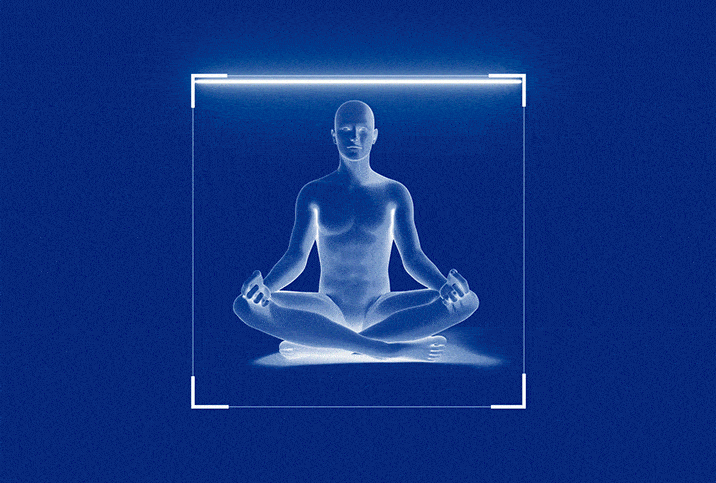Will a Meditative Mind Help Mental and Sexual Health?

The first time I meditated in earnest, alone on my apartment floor, I cried.
These weren't the aspirational tears of an aesthetically-clad influencer gracefully seated in a lotus pose, awash in self-love. They were gritty, soppy and forceful, a product of facing my raw emotions in stark sobriety for the first time in over a decade.
As a person with multiple chronic health issues, including clinical depression and anxiety, the thought of sitting with my feelings and the sensations of my body had never seemed appealing. However, after a particularly tumultuous bout of suicidal ideation, it was apparent alcohol, drugs and avoidance weren't reliable salves.
Mindfulness is a practice that trains the mind to focus on the present moment.
Contrary to what many strangers have told me, unprompted meditation—such as eating a plant-based diet, spending more time in nature or taking medication—has not cured me.
But it has improved my health.
What is mindfulness?
I know my experience isn't unique. Myriad studies indicate mindfulness—be it in the form of yoga, sitting meditation or casual yet consistent habits—can have a remarkable effect on mental health and, subsequently, sexual well-being.
Mindfulness is a practice that trains the mind to focus on the present moment. It's a core principle of meditation and related practices, such as Tai Chi and yoga.
"This is a conscious awareness of our thoughts, feelings and sensations and tuning into our environment without any evaluation or judgment—a complete and compassionate acceptance of whatever is happening now," said Michael T. Mongno, M.Sc., M.F.T., a psychotherapist at Present Centered Therapies in New York City.
Originally popularized by Buddhist teachings, mindfulness is now routinely used in healthcare settings—including a particular type of psychotherapy called mindfulness-based cognitive therapy—to treat conditions such as insomnia, depression, anxiety, eating disorders, stress and chronic pain.
The science behind mindfulness and mental health
In the West, formal research into mindfulness' scientific benefits began in 1979, when Jon Kabat-Zinn, a professor of medicine who studied Buddhist teachings extensively, developed what is now the mindfulness-based stress reduction (MBSR) program at the University of Massachusetts Medical Center.
The eight-week program, which combined Buddhist principles and Hatha yoga, was designed to treat chronically ill patients who weren't responding well to traditional modalities and to make care more accessible to people living busy lives.
Due to its success, the program became a wellspring for further investigations.
In the past few decades, several studies have demonstrated how practicing mindfulness meditation consistently over time can produce pronounced changes in the brain's prefrontal cortex. This part of the brain is responsible for executive functioning, including planning, attention, problem-solving and emotional regulation. Specifically, Mongno said, it can increase gray matter density and strengthen neural connections, positively affecting brain chemistry, mood and cognitive function.
"This calming of the sympathetic nervous system allows for an energizing response that strengthens parts of the brain responsible for attention and learning, thus creating a positive feedback loop for increased self-awareness," Mongno said.
Mindfulness meditation may also stimulate the production and release of hormones and chemicals, such as serotonin and oxytocin, which positively affect multiple facets of well-being, such as mood, relaxation and social bonding.
Research appears to confirm the efficacy of mindfulness for particular mental health conditions, including anxiety and depression.
For example, a 2020 meta-analysis of 14 studies published in Psychiatry Research found MBSR was "significantly superior" to control conditions in treating anxiety in young people. And a 2018 meta-analysis published in Behavior Research and Therapy indicated a regular mindfulness practice could help to treat anxiety and depression, even when used independently of other therapeutic modalities.
Can mindfulness help with specific mental health issues?
For people with mental health conditions, such as anxiety and depressive disorders, the sympathetic nervous system tends to be in overdrive, explained Kaylee Rose Friedman, L.P.C., a trauma-informed therapist practicing in Los Angeles.
The brain is constantly seeking and perceiving threats—often imagined—and skewing our perspective to emphasize the negative. You might ruminate about the past, feel consumed with worry about the future or both.
Mindfulness can help by subduing the central nervous system, shifting focus to the present, which tends to feel safer and more manageable.
Moreover, by "rewiring the brain" over time, mindfulness can strengthen our ability to access feelings of safety and connection, Rose Friedman continued.
It may help to bring awareness to thoughts and behaviors we'd otherwise act upon or engage in without thinking, and differentiate between things that are within and outside of our control, noted Jillian Amodio, M.S.W., a social worker in Annapolis, Maryland, and the founder of Moms for Mental Health.
Being well-attuned to your thoughts, emotions and sensations may help you assess how situations, environments and relationships affect your well-being.
"Mindfulness can help us address cognitive distortions, develop a sense of gratitude and trust ourselves and the world around us," she added. "Mindfulness can put us back in the driver's seat of our lives rather than continuing along as an unwilling or uninvolved passenger. Mindfulness can also help us to experience life more fully and to create a sense of peace and joy where there was once anxiety and sorrow."
Plus, being well-attuned to your thoughts, emotions and sensations moment-to-moment may help you to more accurately assess how situations, environments and relationships affect your well-being, said Meredith Waller, L.C.S.W., founder of Rooted Wellness Counseling in Boulder, Colorado.
"Intentionally making choices that better align with your needs may naturally reduce cortisol levels and, in turn, help to improve mental and overall health," she added.
However, experts note mindfulness may not be for everyone.
Although it can be a part of treatment for trauma and post-traumatic stress disorder (PTSD), experts advise working with a trauma-informed professional before trying it on your own. This is particularly important for people in the early stages of recovery, as some aspects of the practice might be triggering.
"There are many ways to practice mindfulness that are trauma-informed and helpful for people with PTSD, like yoga, walking meditation or mindful eating," Rose-Friedman said. "Working with someone who understands your trauma and your life context can help you get started in a safer way."
How can mindfulness help with sexual health?
Mental health conditions can affect all facets of well-being, including sexual health. Stress, depression and anxiety, for instance, are the most common causes of erectile dysfunction (ED) in men under 40 years old. These and related disorders also frequently contribute to problems like low libido, diminished sexual confidence, and weak or absent orgasms.
By helping to alleviate mental health challenges, experts said, mindfulness may improve sex drive and sexual satisfaction. It may also enhance intimacy—with yourself and others—by helping you to focus on the present and savor pleasurable sensations.
"When we encourage our brain to focus on the present moment, we are much more in-tune with our authentic selves and can operate from a place of genuineness, rather than fear or stress," Waller said. "Not only does this allow us to be more intentional about our needs, but it gives us more space to be present for those around us and more fully engage in the experiences we are living, improving our relationship with ourselves and with others."
One way to incorporate mindfulness in the bedroom is via a "body inventory," explained Wendy Schofer, M.D., a pediatrician and certified life and health coach in Wilmington, Delaware.
"Ask yourself, what am I feeling now? Scan your body. What feels amazing right now? What needs attention? The practice of mindfulness helps us connect with our physical sensations," she said. "When we identify and meet our physical needs, we have so much more sexual pleasure because we don't need someone else to address our needs. We are caring for ourselves, and then connecting with others is a special bonus. Mindfulness is another form of sexual health self-care."
Incorporating mindfulness into daily life
Experts recommend establishing a regular practice. Ideally, that would be a combination of formal meditation and informal habits, as consistency is key to getting the most out of mindfulness.
"Informal meditation is when you infuse mindfulness into your everyday activities," Rose-Friedman said.
One example would be to take a shower and pay close attention to the sensations of the water, the loofah against your skin and the scents of the soap and shampoo, she explained. Another example might be to put away your phone and sit with a cup of coffee, paying attention to the drink's scent and taste, and the warmth of the cup in your hands.
"Each time your mind wanders to your grocery list or the fight you had with your boss yesterday, simply work to bring it back to whatever is happening in the present moment," she said. "Any activity that you do throughout the day can be a mindfulness exercise."
More structured mindfulness techniques include yoga, Tai Chi, sitting meditations and walking meditations. A few practices recommended for mental health include:
- Body scan meditation. A good entry point to mindfulness meditations, a body scan involves gradually bringing awareness to each part of the body, noticing sensations without judgment.
- Loving-kindness meditation. This practice focuses on directing loving, compassionate energy toward yourself and others.
- Mindful breathing. An accessible practice for beginners, mindful breathing entails focusing solely on your breath. It's thought to help with emotional regulation.
Mindfulness is for everyone
Although mindfulness may seem intimidating—especially if you struggle to focus or quell your inner dialogue—experts insist mindfulness techniques can be beneficial and accessible to anyone, regardless of health status or lifestyle.
"Starting to adopt a mindfulness practice isn't easy and takes practice. The most basic thing to remember is to go easy on yourself," said Shannon Dobbs, Psy.D., co-founder of FOY Wellness and Recovery Center in Agoura Hills, California. "If your mind wanders, so what. It's supposed to. It's like telling your heart to stop beating. Let it wander and bring it back to whatever approach you are using. It will get easier to relax in time."



















Commentary